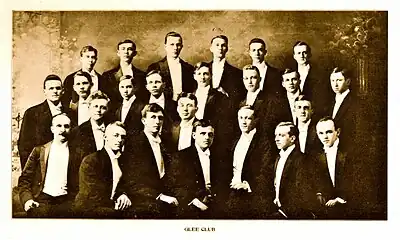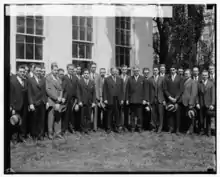Glee club
A glee club in the United States is a musical group or choir group, historically of male voices but also of female or mixed voices, which traditionally specializes in the singing of short songs by trios or quartets. In the late 19th century it was very popular in most schools and was made a tradition to have in American high schools from then on.

Glee clubs were named after a form of English part song, called a glee, which they typically sang. The first named Glee Club held its initial meeting in the Newcastle Coffee House in London in 1787.[1] Glee clubs were very popular in Britain from then until the mid-1850s but by then they were gradually being superseded by larger choral societies. By the mid-20th century, proper glee clubs were no longer common.
Testifying to the importance of glee clubs in 19th Century America, Henry Stone, a Union veteran of the American Civil War, recalled that "A glee club came down from Chicago, bringing with them the new song, "We'll rally 'round the flag, boys" (Battle Cry of Freedom), and it ran through the camp like wildfire. The effect was little short of miraculous. It put as much spirit and cheer into the army as a victory."
The term remains in contemporary use, for choirs established in North American colleges, universities, and high schools, although most American glee clubs are choruses in the standard sense, and rarely perform glees.
Oldest United States collegiate glee clubs

The oldest collegiate glee clubs in the United States are, by year of foundation:
- 1858: Harvard Glee Club[2]
- 1859: University of Michigan Men's Glee Club
- 1861: Yale Glee Club
- 1862: Wesleyan University Glee Club[3]
- 1862: The University of Pennsylvania Glee Club[4]
- 1865: Amherst College Glee Club[5]
- 1868: Cornell University Glee Club[6]
- 1869: Union College Men's Glee Club
- 1869: Lehigh University Glee Club
- 1871: Virginia Glee Club[7]
- 1872: Rutgers University Glee Club[8]
- 1873: Columbia University Glee Club[9]
- 1874: Princeton Glee Club
- 1874: Worcester Polytechnic Institute Men's Glee Club
- 1875: The Ohio State University Men's Glee Club[10]
- 1877: The Mount Holyoke College Glee Club[11]
- 1886: The University of Illinois Varsity Men's Glee Club[12]
- 1888: Penn State Glee Club[13]
- 1890: Pitt Men's Glee Club
- 1890: The University of Kansas Men's Glee Club
- 1892: The Pomona College Men's Glee Club[14]
- 1892: Wabash College Glee Club[15]
- 1893: University of Michigan Women’s Glee Club[16]
- 1893: Purdue Varsity Glee Club[17]
- 1893: Texas A&M Singing Cadets[18]
- 1897: Case Men's Glee Club (Case Institute of Technology and Western Reserve University)
- 1901: The University of Oklahoma Men's Glee Club
- 1902: The Pomona College Women's Glee Club [19]
- 1903: West Point Glee Club[20]
- 1906: Georgia Tech Glee Club[21]
- 1907: Wheaton College Men's Glee Club,[22] Miami University Glee Club
- 1911: Morehouse College Glee Club[23]
- 1915: University of Notre Dame Glee Club
- 1916: Tiger Glee Club (Louisiana State University)[24]
- 1927: University of Pittsburgh Women's Choral Ensemble
The oldest non-collegiate glee club in the United States is the Mendelssohn Glee Club, founded in 1866.[25]
References
- Bacon, Richard Mackenzie (1820). "The Catch and Glee Clubs". The Quarterly Musical Magazine and Review. London. II (VII): 328ff.
- "History of the Harvard Glee Club". Retrieved October 15, 2009.
- Mark Slobin (2010). "A Remarkably Musical Campus" (PDF). Wesleyan (11): 32–35. Archived from the original (PDF) on May 6, 2014.
- "The University of Pennsylvania Archives".
- "Amherst Glee Club Website". Archived from the original on June 28, 2011.
- "Glee Club History". Archived from the original on January 7, 2009. Retrieved December 13, 2009.
- Bruce, Philip Alexander (1921). History of the University of Virginia, 1818-1919. Vol. IV. MacMillan. pp. 127–128, 841.
- "RU Glee Club History". Archived from the original on July 17, 2010. Retrieved January 21, 2010.
- "Glee Club". Columbia College and Columbia Engineering. Retrieved July 17, 2022.
- "Official webpage of the Ohio State University Men's Glee Club". January 27, 2015. Retrieved February 4, 2015.
- "Choral Ensembles". Mount Holyoke College. November 15, 2016. Retrieved November 19, 2017.
- "Varsity Men's Glee Club | Music at Illinois". music.illinois.edu. Retrieved October 8, 2019.
- "Penn State Glee Club history". Retrieved August 8, 2015.
- "The Men's Glee Club (1892–1982)". Pomona College Choir and Glee Club. Pomona College. Retrieved October 15, 2022.
- "Academics". Wabash College. Retrieved September 4, 2017.
- "University of Michigan Women's Glee Club". Retrieved February 28, 2018.
- "Purdue Varsity Glee Club History". Retrieved February 15, 2017.
- "The History of the Fightin' Texas Aggie Singing Cadets". Retrieved November 16, 2018.
- "The Women's Glee Club (1902–1982)". Pomona College Choir and Glee Club. Pomona College. Retrieved October 15, 2022.
- "The United States Military Academy Glee Club". Retrieved August 18, 2020.
- "About the Georgia Tech Glee Club". Retrieved April 17, 2020.
- "Wheaton College Men's Glee Club". Archived from the original on November 14, 2016. Retrieved November 14, 2016.
- "The Official Morehouse Glee Club Website". Retrieved September 19, 2015.
- "Choir at LSU". Retrieved December 3, 2020.
- New York Library for the Performing Arts. "Mendelssohn Club Papers" (PDF). Retrieved February 25, 2011.
Further reading
- J. Lloyd Winstead (2013) When Colleges Sang: The Story of Singing in American College Life University of Alabama Press ISBN 978-0-8173-1790-4